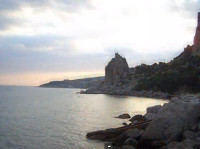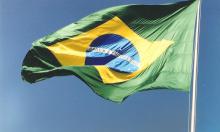Sanctions against Crimea don't know difference between chalk and cheese

On December 19, the Official Journal of the European Union published a message about the introduction of new sanctions against the Crimea. European officials decided to ban investment in the Crimean economy, exports of Crimean goods there (if they are not certified in Ukraine). Most importantly, European citizens were barred from visiting the Crimea.
The reason, of course, is Russia's policy to reunify with the peninsula. The purpose of the new sanctions, apparently, is to complicate the life of Crimean residents to make them want to go back to Ukraine, to the delight of Kiev and its patrons in Brussels and Washington.
Just how justified are these hopes? One may say at once that the Crimea has never produced any goods that could be competitive enough to be exported to the West. Tourism has always been the main source of income for the Crimea. However, tourism in the Crimea has never been highly important in the life of European citizens.
In the last "peaceful" year, Crimean resorts and spas welcomed about six million people. Two-thirds of them - four million people - were citizens of Ukraine, followed by 300 thousand Russian and 250 thousand Belarusian tourists. The rest - 500 thousand tourists - came from the EU, Turkey, Azerbaijan, Kazakhstan, Israel and other countries.
It is not quite clear, what Turkish citizens were doing in Crimean resorts - they have beautiful beaches and high-class resorts of their own.
How did the tourist season go for the Crimea this year, after the peninsula became a part of Russia again? The number of tourists has dropped to three million, which marked a 50-percent reduction. Yet, the overwhelming majority of them were Russians. The rest came from CIS countries and Ukraine.
There were no European guests on the Crimea this year. It brings up the idea that the alleged "new sanctions" against the free Crimea that limited traveling to the peninsula for European nationals is nothing but much ado about nothing. This new restriction does not harm anyone, whether it goes about Europeans, Moscow or the Crimea.
In this regard, the change of flags on the Crimea has not played a big role for Crimean resorts and holiday centers. If the Crimea had remained a part of Ukraine, impoverished Ukrainian citizens would not have been able to travel to the Crimea for holidays, as they did before.
After all, their salaries and allowances would have been "optimized" two or three times. The rate of the US currency has grown to 22-25 hryvnia per dollar, compared with eight hryvnia per one dollar during the "criminal regime" of Victor Yanukovych. In a nutshell, the purchasing capacity of the majority of ordinary Ukrainian citizens has fallen five-six times. Holiday-making does not remain a priority for common people under such circumstances.
Interestingly, the devaluation of the Russian ruble has significantly diminished "appetites" of those Russians, who, sacrificing their patriotic feelings, preferred to spend holidays in the resorts of Thailand, Turkey, Egypt, Spain and a variety of other countries. Firstly, the ruble income of most Russians has dropped against the growing dollar and euro rates. Secondly, many Russians no longer want to spend their money in the countries that remain so hostile against Russia, singing in the US choir.
The biggest problem, for the time being, is the problem of how to get into the Crimea. The capacity of the Kerch crossing remains low. Railway routes via Ukraine remain dangerous to Russian citizens.
Noteworthy, the local Crimean economy remains primarily dependent on the income of local residents. After the reunification of the region with Russia, local revenues have been growing steadily. Even after the decline of the Russian ruble, the basic salaries of Russians are several times higher than those of the Ukrainians.
Finally, the Crimea has always been more than "just another region" of the great country. This is a place where so much Russian blood has been shed. Noteworthy, during the Soviet years, the city of Sevastopol was "closed" for foreigners. Even Soviet citizens had to obtain personal invitations to go there.
Therefore, the new European sanctions against the Crimea are useless. They are just another move in the geopolitical war against Russia. But, as they say in Russia, you can't scare a hedgehog with your naked arse.
Yury Nosovsky
Pravda.Ru
Subscribe to Pravda.Ru Telegram channel, Facebook, RSS!




